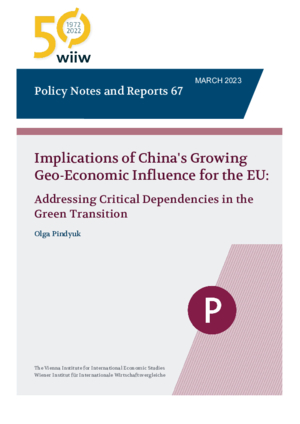Implications of China's Growing Geo-Economic Influence for the EU: Addressing Critical Dependencies in the Green Transition
wiiw Policy Note/Policy Report No. 67, March 2023
19 pages including 2 Figures
Although China has become a major trading partner of the EU, the EU-China relationship has deteriorated over the last decade. This has been demonstrated, for example, by disputes over trade issues, unequal treatment of EU investors by Beijing, frictions over the transfer of intellectual property, and human rights violations. The EU’s critical dependency on supplies from China, which became evident during the COVID-19 pandemic, further complicates the relationship. The issue of the green transition has a central importance in the context of intensified geo-economic competition and possible decoupling from China, as here the EU has critical dependencies on the country, which is responsible for about 60% of global extraction of rare earth elements, about 60-65% of global processing of lithium and cobalt, and nearly 90% of global processing of rare earth elements.
So far, EU policy with respect to China has lacked co-ordination and solidarity, with the splits running across countries, institutions and economic sectors. This makes it challenging for the EU to develop a unified strategy toward Beijing. This paper examines the issues and sets out our suggestions for the policies the EU and Austria can undertake to decrease the bloc’s dependency on China in supplies of critical inputs for its green transition and to minimise the vulnerabilities of their economies.
Keywords: China, European Union, Geopolitics, Geo-economic policy, Renewable energy, Energy security, Energy transition, Critical materials, Rare earth elements
JEL classification: F02, F50, F52, F64, Q28, Q48, Q58
Countries covered: Austria, China, European Union, US
Research Areas: International Trade, Competitiveness and FDI, Sectoral studies
